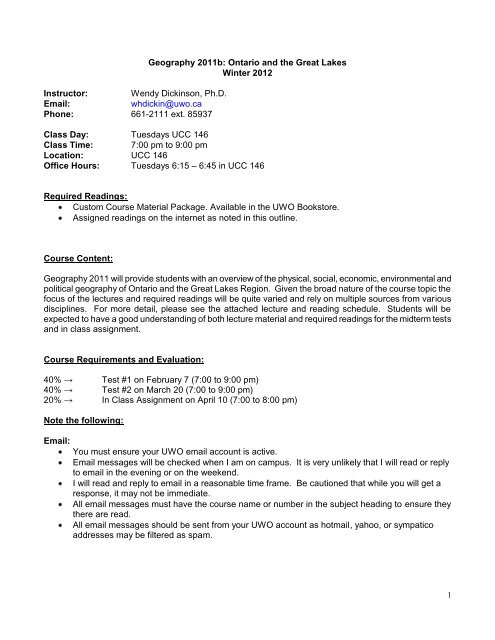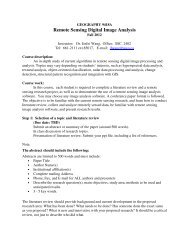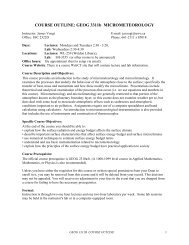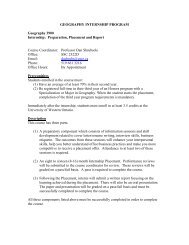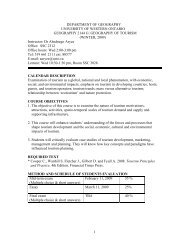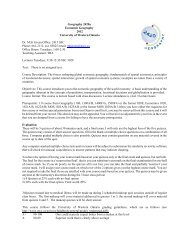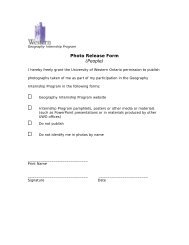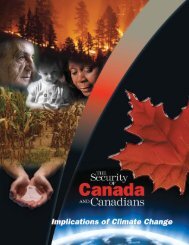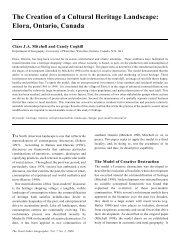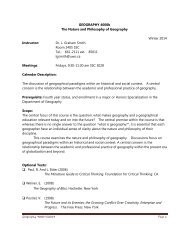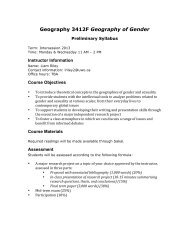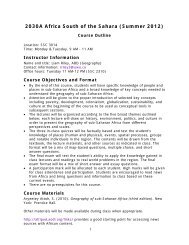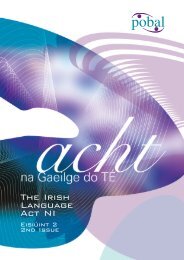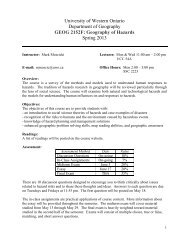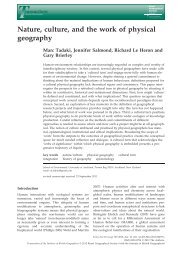Ontario and the Great Lakes - Geography, Department of
Ontario and the Great Lakes - Geography, Department of
Ontario and the Great Lakes - Geography, Department of
Create successful ePaper yourself
Turn your PDF publications into a flip-book with our unique Google optimized e-Paper software.
Instructor: Wendy Dickinson, Ph.D.<br />
Email:<br />
whdickin@uwo.ca<br />
Phone: 661-2111 ext. 85937<br />
<strong>Geography</strong> 2011b: <strong>Ontario</strong> <strong>and</strong> <strong>the</strong> <strong>Great</strong> <strong>Lakes</strong><br />
Winter 2012<br />
Class Day: Tuesdays UCC 146<br />
Class Time: 7:00 pm to 9:00 pm<br />
Location: UCC 146<br />
Office Hours: Tuesdays 6:15 – 6:45 in UCC 146<br />
Required Readings:<br />
Custom Course Material Package. Available in <strong>the</strong> UWO Bookstore.<br />
Assigned readings on <strong>the</strong> internet as noted in this outline.<br />
Course Content:<br />
<strong>Geography</strong> 2011 will provide students with an overview <strong>of</strong> <strong>the</strong> physical, social, economic, environmental <strong>and</strong><br />
political geography <strong>of</strong> <strong>Ontario</strong> <strong>and</strong> <strong>the</strong> <strong>Great</strong> <strong>Lakes</strong> Region. Given <strong>the</strong> broad nature <strong>of</strong> <strong>the</strong> course topic <strong>the</strong><br />
focus <strong>of</strong> <strong>the</strong> lectures <strong>and</strong> required readings will be quite varied <strong>and</strong> rely on multiple sources from various<br />
disciplines. For more detail, please see <strong>the</strong> attached lecture <strong>and</strong> reading schedule. Students will be<br />
expected to have a good underst<strong>and</strong>ing <strong>of</strong> both lecture material <strong>and</strong> required readings for <strong>the</strong> midterm tests<br />
<strong>and</strong> in class assignment.<br />
Course Requirements <strong>and</strong> Evaluation:<br />
40% → Test #1 on February 7 (7:00 to 9:00 pm)<br />
40% → Test #2 on March 20 (7:00 to 9:00 pm)<br />
20% → In Class Assignment on April 10 (7:00 to 8:00 pm)<br />
Note <strong>the</strong> following:<br />
Email:<br />
You must ensure your UWO email account is active.<br />
Email messages will be checked when I am on campus. It is very unlikely that I will read or reply<br />
to email in <strong>the</strong> evening or on <strong>the</strong> weekend.<br />
I will read <strong>and</strong> reply to email in a reasonable time frame. Be cautioned that while you will get a<br />
response, it may not be immediate.<br />
All email messages must have <strong>the</strong> course name or number in <strong>the</strong> subject heading to ensure <strong>the</strong>y<br />
<strong>the</strong>re are read.<br />
All email messages should be sent from your UWO account as hotmail, yahoo, or sympatico<br />
addresses may be filtered as spam.<br />
1
Remarking <strong>of</strong> Test or Assignment Marks:<br />
I will review any test or exam resubmitted to me, but please be advised that <strong>the</strong> grade may<br />
increase or decrease.<br />
All tests <strong>and</strong> assignments returned during <strong>the</strong> course should be retained until <strong>the</strong> final grade in <strong>the</strong><br />
course has been issued. In <strong>the</strong> case <strong>of</strong> a disagreement regarding <strong>the</strong> recorded marks it will be<br />
necessary to produce <strong>the</strong> graded item in order for a change to be made. There will be no extra<br />
assignments to make up marks.<br />
Statement on Use <strong>of</strong> Electronic Devices:<br />
Absolutely no electronic devices may be used during <strong>the</strong> tests or in –class assingment.<br />
Academic Integrity:<br />
Do your own work! This course has a zero-tolerance policy for academic <strong>of</strong>fences. Scholastic <strong>of</strong>fences<br />
are taken seriously <strong>and</strong> students are directed to read <strong>the</strong> appropriate policy, specifically, <strong>the</strong> definition <strong>of</strong><br />
what constitutes a Scholastic Offence, at <strong>the</strong> following Web site:<br />
http://www.uwo.ca/univsec/h<strong>and</strong>book/appeals/schol<strong>of</strong>f.pdf .<br />
Final Grades:<br />
Students should be aware that <strong>the</strong> mark awarded by an instructor in a course at UWO is only final when<br />
<strong>the</strong>y receive it from <strong>the</strong> Registrar. Even <strong>the</strong>n, final grades can be changed on receipt by <strong>the</strong> Registrar <strong>of</strong><br />
a Marks Revision Form. In all cases <strong>the</strong> final marks are not final until <strong>the</strong> department chair has signed<br />
<strong>of</strong>f.<br />
Medical <strong>and</strong> Non-Medical Accommodation:<br />
Students will be allowed to write “make-up” exams or submit assignments late only under special<br />
circumstances. These include medical or compassionate reasons, <strong>and</strong> must be substantiated with<br />
proper documentation as soon as possible (e.g., medical certification verifying that you are unable to<br />
write an exam; certificates stating “for medical reasons” are not sufficient). Please note that <strong>the</strong><br />
documentation must be submitted to (<strong>and</strong> approved by) an academic counsellor in your Dean’s<br />
<strong>of</strong>fice. A student who misses an exam for any o<strong>the</strong>r reason, or who is unable to substantiate a claim in<br />
a timely fashion, will be assigned a grade <strong>of</strong> zero for that exam. In fairness to all, no exceptions to this<br />
policy will be allowed. Please see <strong>the</strong> POLICY ON ACCOMMODATION FOR MEDICAL ILLNESS –<br />
UNDERGRADUATE STUDENTS at http://www.uwo.ca/univsec/h<strong>and</strong>book/appeals/medical.pdf for<br />
additional information on appropriate documentation.<br />
GRADING GUIDELINES:<br />
Grade descriptions<br />
A+ 90-100 one could scarcely expect better from a student at this level<br />
A 80-89 superior work which is clearly above <strong>the</strong> average<br />
B 70-79 good work, meeting all <strong>the</strong> requirements, <strong>and</strong> eminently satisfactory<br />
C 60-69 competent work, meeting requirements<br />
D 50-59 fair work, minimally acceptable<br />
F below 50 fail<br />
2
A CODE OF CONDUCT FOR STUDENTS. STAFF, AND FACULTY FOR THE DEPARTMENT OF<br />
GEOGRAPHY<br />
Affiliation with <strong>the</strong> <strong>Department</strong> <strong>of</strong> <strong>Geography</strong> presumes mutual respect among students, staff, teachingassistants,<br />
<strong>and</strong> faculty. A positive atmosphere <strong>of</strong> pr<strong>of</strong>essionalism <strong>and</strong> collegiality is essential for<br />
everyone to perform to <strong>the</strong> best <strong>of</strong> his or her abilities. This requires respect for <strong>the</strong> opinions <strong>and</strong><br />
questions <strong>of</strong> o<strong>the</strong>rs <strong>and</strong> behaviour that is, at all times, courteous, <strong>and</strong> conducive to creating a pleasant<br />
<strong>and</strong> productive environment for learning <strong>and</strong> working.<br />
As members <strong>of</strong> a <strong>Department</strong> <strong>of</strong> <strong>Geography</strong>, we are expected to show special respect for our<br />
environment, being individually responsible for promoting- a clean <strong>and</strong> safe work environment within <strong>the</strong><br />
facilities <strong>of</strong> <strong>the</strong> <strong>Department</strong> <strong>and</strong> <strong>the</strong> Social Science Centre, including classrooms, laboratories, <strong>the</strong> Map<br />
Library, <strong>of</strong>fices, hallways, washrooms, exterior grounds, <strong>and</strong> <strong>the</strong> facilities <strong>and</strong> vehicles used in field<br />
courses <strong>and</strong> field trips.<br />
It is inevitable that misunderst<strong>and</strong>ings will occur from time to time. However, it is in everyone's interest to<br />
try <strong>and</strong> resolve problems in a non-confrontational manner. Threatening, violent, or abusive behaviour,<br />
harassment (including sexual <strong>and</strong> racial harassment), rudeness (in person, in writing, or on <strong>the</strong><br />
telephone), <strong>and</strong> abuse <strong>of</strong> authority, for whatever reasons, corrode good working <strong>and</strong> learning<br />
conditions.<br />
Incidents that cannot be resolved amicable may be reported to <strong>the</strong> Chair <strong>of</strong> <strong>the</strong> <strong>Department</strong> (519 661-<br />
4004). The Chair will consider appropriate actions for resolving <strong>the</strong> problem, usually after consultation<br />
with <strong>the</strong> parties involved. If required, contact with university services (e.g. Police, Equity) or civil<br />
authorities will be invoked.<br />
Student Use <strong>of</strong> University Facilities <strong>and</strong> Classroom Decorum:<br />
* Students are expected to comply with <strong>the</strong> authority <strong>of</strong> University staff <strong>and</strong> faculty on all matters<br />
relating to access to facilities (<strong>of</strong>fices, classrooms, laboratories, <strong>and</strong> Map Library) <strong>and</strong> <strong>the</strong><br />
use <strong>of</strong> equipment <strong>and</strong> resources.<br />
* Students are expected to attend all lectures <strong>and</strong> laboratory sessions regularly <strong>and</strong> punctually.<br />
* Instructors are responsible for maintaining an appropriate academic atmosphere in all class<br />
activities, students are expected to cooperate in this effort.<br />
* Actions that impede instruction, deter <strong>the</strong> ability <strong>of</strong> students to learn, or show disrespect for<br />
instructors <strong>and</strong> fellow students, will not be condoned in <strong>Geography</strong> classrooms <strong>and</strong> labs.<br />
Such actions include reading during lectures, disturbing consumption <strong>of</strong> food or drink, use<br />
<strong>of</strong> walkmans, Ipods, <strong>and</strong> radios, or laptops <strong>and</strong> disruptive conversation. Serious<br />
disrespect for classroom decorum should be reported to <strong>the</strong> instructor <strong>and</strong>, if required, to<br />
<strong>the</strong> Chair <strong>of</strong> <strong>the</strong> <strong>Geography</strong> <strong>Department</strong> (SSC 2333, Telephone 519 661-2111 x 83423).<br />
* Students are expected to adhere to University st<strong>and</strong>ards <strong>of</strong> academic honesty, as outlined<br />
under "Scholastic Offenses" in <strong>the</strong> Western Calendar. Unacceptable practices include<br />
cheating, impersonation, plagiarism, misrepresentation <strong>of</strong> research, falsification <strong>of</strong><br />
documents, obstructing <strong>the</strong> academic activities <strong>of</strong> ano<strong>the</strong>r, aiding or abetting academic<br />
misconduct, <strong>and</strong> abuse <strong>of</strong> confidentiality. In addition to incurring penalties, as outlined in<br />
<strong>the</strong> Calendar, some academic <strong>of</strong>fenses may fall under <strong>the</strong> Criminal Code <strong>of</strong> Canada.<br />
Support Services: Registrarial Services: http://www3.registrar.uwo.ca/index.cfm<br />
Student Development Services: http://www.sdc.uwo.ca/<br />
3
PART ONE: PHYSICAL AND ENVIRONMENTAL GEOGRAPHY<br />
January 10: Introduction<br />
January 17: Physical <strong>Geography</strong> <strong>and</strong> Environmental Issues: Part 1<br />
January 24: Environmental Issues: Part 2 <strong>and</strong> Part 3<br />
January 31: Environmental Issues: Part 4<br />
February 7: TEST (40%)<br />
Required Readings for Part One:<br />
The <strong>Great</strong> <strong>Lakes</strong>: An Environmental Atlas <strong>and</strong> Resource Book, Jointly produced by <strong>the</strong><br />
Government <strong>of</strong> Canada <strong>and</strong> United States Environmental Protection Agency, Third Edition, 1995<br />
(http://www.epa.gov/glnpo/atlas/index.html)<br />
Chapter One – Introduction: The <strong>Great</strong> <strong>Lakes</strong><br />
Chapter Two – Natural Processes in <strong>the</strong> <strong>Great</strong> <strong>Lakes</strong><br />
Chapter 4 – The <strong>Great</strong> <strong>Lakes</strong> Today – Concerns<br />
The Forest Resources <strong>of</strong> <strong>Ontario</strong> 2006: State <strong>of</strong> <strong>the</strong> Forest Report (<strong>Ontario</strong> Ministry <strong>of</strong> Natural<br />
Resources).<br />
(//www.mnr.gov.on.ca/stdprodconsume/groups/lr/@mnr/@forests/documents/document/mnr_e005279.p<br />
df)<br />
Chapter 2: Physical <strong>Geography</strong> <strong>of</strong> <strong>Ontario</strong><br />
“A Late <strong>Great</strong> Lake”, by W. Stewart from Canadian Geographic, September/October 2003, Volume<br />
123, No. 5, pp. 36-46. Available in your course package.<br />
“To Have <strong>and</strong> Have Not” by P. Annin (2006) from The <strong>Great</strong> <strong>Lakes</strong> Water Wars, pp. 3 – 21. Available<br />
in your course package.<br />
PART TWO: INSTITIONAL ARRANGEMENTS AND REGIONAL GEOGRAPHY<br />
February 14: IJC & Remedial Action Plans<br />
February 21: READING WEEK – NO CLASS<br />
February 28: Conservation Authorities<br />
March 6: Social &Economic <strong>Geography</strong><br />
March 13: Heartl<strong>and</strong> <strong>and</strong> Region-State<br />
March 20: TEST (40%)<br />
Required Readings for Part Two:<br />
“Institutions <strong>and</strong> Rules for <strong>the</strong> Environment <strong>of</strong> <strong>the</strong> <strong>Great</strong> <strong>Lakes</strong>” by M. Sproule-Jones (2002) from<br />
Restorations <strong>of</strong> <strong>the</strong> <strong>Great</strong> <strong>Lakes</strong>: Promises, Practices <strong>and</strong> Performances. Available in your<br />
course package.<br />
“Keeping Remedial Action Plans on Target: Lessons Learned from Collingwood Harbour” by G.<br />
Krantzberg from Journal <strong>of</strong> <strong>Great</strong> <strong>Lakes</strong> Research 29 (4): 641-651 (2003). Available in your<br />
course package.<br />
“<strong>Great</strong> <strong>Lakes</strong> Blueprint: A Canadian Vision for Protecting <strong>and</strong> Restoring <strong>the</strong> <strong>Great</strong> <strong>Lakes</strong> <strong>and</strong> St.<br />
Lawrence River Ecosystem”, by Ecodefence (2007).<br />
(http://www.cielap.org/pdf/<strong>Great</strong><strong>Lakes</strong>Blueprint.pdf)<br />
4
“<strong>Ontario</strong>: The Dominant Half <strong>of</strong> <strong>the</strong> Core” by B. McGillivray (2006) from Canada: A Nation <strong>of</strong><br />
Regions. Available in your course package.<br />
Excerpt from The Way <strong>the</strong> Crow Flies, by Anne-Marie MacDonald (2004), pp. 14-18. Available in your<br />
course package.<br />
“Interpreting Canada’s Heartl<strong>and</strong> <strong>and</strong> Hinterl<strong>and</strong>” by L. McCann (1998) from Heartl<strong>and</strong> <strong>and</strong><br />
Hinterl<strong>and</strong>: A Regional <strong>Geography</strong> <strong>of</strong> Canada. Available in your course package.<br />
“The Next <strong>Ontario</strong>” by J. Ibbitson (2001) from Loyal No More: <strong>Ontario</strong>’s Struggle for a Separate<br />
Destiny. Available in your course package.<br />
“The New <strong>Ontario</strong>: A North American Region State” by T. Courchene <strong>and</strong> C. Telmer (1998) from<br />
From Heartl<strong>and</strong> to North American Region State: The Social, Fiscal <strong>and</strong> Federal Evolution <strong>of</strong><br />
<strong>Ontario</strong>. Available in your course package.<br />
“Is <strong>Ontario</strong> a Region State” by N. Wiseman, et.al. (2000) in Policy Options vol. 21.<br />
http://www.irpp.org/po/archive/jan00/ontario.pdf<br />
PART THREE: ONTARIO’S NORTH AND OVERALL IMPRESSIONS<br />
March 27: Nor<strong>the</strong>rn <strong>Ontario</strong><br />
April 3: Nor<strong>the</strong>rn <strong>Ontario</strong><br />
April 10: IN CLASS ASSIGNMENT (20%)<br />
Required Readings for Part Three:<br />
“Nor<strong>the</strong>rn Perceptions” by R.M. Bone (2009) in The Canadian North: Issues <strong>and</strong> Challenges<br />
“The City <strong>of</strong> Elliot Lake to 1991: Before <strong>the</strong> Ro<strong>of</strong> Fell In” by S. Heard (1997) in Boom Town Blues:<br />
Elliot Lake: Collapse <strong>and</strong> Revival in a Single Industry Community.<br />
“Creating a Sustainable Community: The Sudbury Case Study” by O. Saarinen (1992) in At <strong>the</strong> End<br />
<strong>of</strong> <strong>the</strong> Shift: Mines <strong>and</strong> Single-Industry Towns in Nor<strong>the</strong>rn <strong>Ontario</strong>.<br />
5


